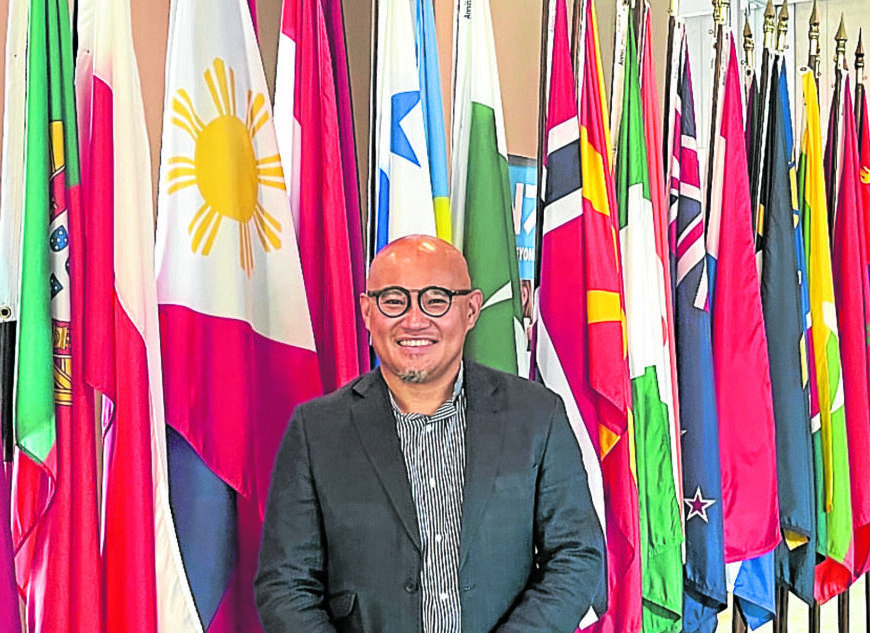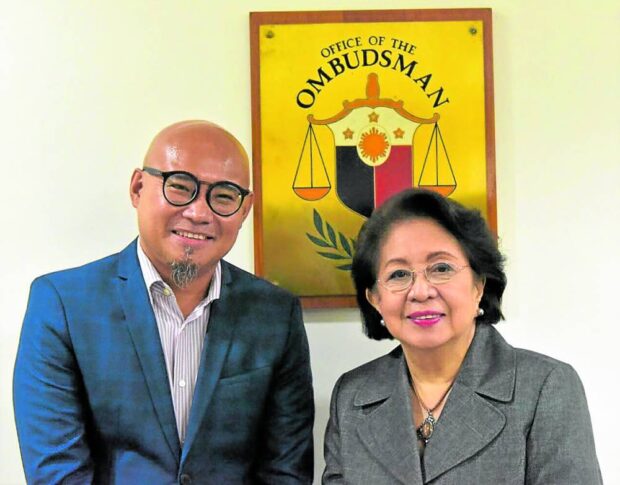Anticorruption warrior

El Cid Butuyan is quick to correct any notion that he is named after the Spanish military leader and hero because of parental expectations that he will grow up to be as esteemed as his namesake.
“I cannot claim such illustrious provenance,” he says. Inspiration for the name actually came from the 1961 Hollywood epic film “El Cid” starring the legendary actor Charlton Heston. The movie made such an impression on the Butuyan patriarch that he named his son after the hero.
Although his father, a rice farmer who was trained as an agriculturist, might not really have expected his son to live up to his name, still being called El Cid, Butuyan says, created some confusion, if not outright problems.
“First, he (father) set me up for failure because I could never live up to my legendary and heroic name! Second, the association to Charlton Heston confuses people—they remember the famous actor but never the right character I was named after. I have been called Ben Hur and Mark Antony by some. I’m still waiting to be called Moses! I suppose it’s because I don’t go around carrying stone tablets (that they have not thought of that other famous Heston role).”
But people who know of him and the work he has done, particularly in both local and global campaigns against corruption, may be inclined to think that the trajectory his career has taken is pretty much befitting that of “The Champion”, the other title bestowed on El Cid.
Butuyan—one of this year’s recipients of the University of the Philippines’ Distinguished Alumni Award, in the category of Good Governance and Anti-Corruption—is among the trailblazers in the fight against unethical practices in both private and public sectors.
“I specialized in transnational anticorruption because it was a nascent field back then. Anticorruption used to be underexplored and undertheorized, but I had a sense that it was highly consequential for corruption-stricken societies, like the Philippines, and I found it professionally stimulating.”
“In the past, there were plenty of sloganeering and posturing, which turned off most people, but I was deeply motivated by the genuine and impactful work of activists, investigative journalists, civil society groups and academics—those outside the formal investigative and prosecutorial institutions, but who made significant, path-clearing contributions to the cause. Then anticorruption as a field began to take off and eventually exploded into a dynamic and exciting practice area,” he explains.
It was just the way Butuyan hoped to practice law or, more accurately, uphold justice.
“I’d like to think I chose ‘justice’ rather than ‘law’,” he says. “Or perhaps, I chose ‘law’ as a profession but ‘justice’ as a vocation.”
A ‘helping profession’
Butuyan has always looked at lawyering as a helping profession, whether in individual cases or for public interest. “You don’t practice law just for the sake of it – you practice law because somebody needs your help, because a problem needs to be solved, or a policy needs to address societal concerns, or an important endeavor needs some firm and clear leadership.”
Other lawyers would be citing precedents, laws and international conventions, but the corruption and graftbuster quotes poets, philosophers and social scientists in explaining the direction he has chosen. He cites, for instance, anthropologist Margaret Mead who said, “Never doubt that a small group of thoughtful committed individuals can change the world. In fact, it’s the only thing that ever has.”
But Butuyan says an older quote from anti-Nazi activist Sophie Scholl has more resonance for him: “The real damage is done by those millions who want to ‘survive.’ The honest men who just want to be left in peace. Those who don’t want their little lives disturbed by anything bigger than themselves. Those with no sides and no causes. Those who won’t take measure of their own strength, for fear of antagonizing their own weakness. Those who don’t like to make waves—or enemies.”
So, while other new graduates could not wait to sign up with big prestigious law firms, Butuyan wanted to devote himself to public interest, and government service was one way to do that kind of work. “Early on, I may have had a keen sense of history and a clear understanding of my purpose: I wanted to devote my energy and talents to public interest issues, whether as a government employee, a fraud and corruption-buster at an international organization or as a competition commissioner,” he says.
He has been and is all those things—government employee, former commissioner of the Philippine Competition Commission, former senior litigation specialist at World Bank (Integrity) and now director and chief ethics officer of the United Nations Children’s Fund.

Graftbuster journey
Butuyan’s first anticorruption battle was when, as a 20-something lawyer and working for a justice of the Supreme Court, he participated as a private prosecutor in the impeachment trial of then President Joseph Estrada. He and some of his colleagues would later walk out as they realized that “public accountability had been turned into a charade.”
In 2004, Butuyan joined the World Bank after graduating from Harvard University with a Master of Laws degree and continued to pursue his anticorruption crusade on a global scale.
“I got involved in shaping the contours of how international organizations—which have long neglected anticorruption as an important aspect of their work—could more effectively help in addressing corruption issues all over the globe. I had the great fortune of tackling corruption for many years at the World Bank, working on policy and establishing frameworks, and leading international investigations in the most challenging contexts, including in the Philippines, China, Vietnam, Indonesia and in so many other countries in the global north,” he says.
Many people would probably consider the initiatives Butuyan’s office had taken in ensuring transparency in World Bank projects and transactions long overdue. Such institutions had been criticized for seemingly abetting corruption in countries they worked with, including the Philippines.
“I started at the World Bank as counsel in the legal department and shifted full time to do international anticorruption work. The tortuous history of the World Bank on this issue is publicly documented. In previous decades, talking about corruption in World Bank projects was taboo. When I came in, earnest efforts were underway to correct this anomaly and steer the World Bank towards fully engaging this issue—to more honestly and more rigorously account for and address corruption issues across countries and within the Bank itself. It was an exhilarating time. I got to take on government entities and major multinational companies alike,” he recalls.
Butuyan says he also helped design various accountability mechanisms to pre-empt, investigate and sanction corrupt practices. “Now, I believe that our anticorruption work has increasingly made a major impact. Fairness, transparency, and accountability turned countries into more attractive investment destinations. Meanwhile, as sanctioned entities sought to improve their operations to regain eligibility for World Bank funding, such as through the adoption of whistleblowing programs, or by corruption-proofing their business dealings, these mechanisms, in turn, created positive spillovers by promoting best practices across industries.”
Butuyan is effusive in his admiration for former Supreme Court Justice and Ombudsman Conchita Carpio-Morales. “She is a personal hero of mine. In fact, we collaborated on quite a few corruption cases. I also had the chance to invite her to speak before experts at the World Bank and to guest-lecture at Harvard Law School, University of Hawaii and University of Cambridge. She inspired all of us with her courage, determination and sharp intellect. But most of all, her unquestionable integrity shines like a beacon in many dark places. She really is an extraordinary individual!”
UP honoree
His work at the World Bank gave Butuyan materials for a college subject. “I gained valuable insights from this experience that I ended up designing a course on Transnational Corruption and teaching the same at Harvard Law School, University of Hawaii and recently at Sciences Po (Paris Institute of Political Studies) in France.”
He would later teach at Harvard Law School when on leave from work or on weekends. “My World Bank work and academia became mutually-reinforcing—I was learning a lot from my research and from my students and, at the same time, I was able to draw upon these learnings and apply them to my work at the Bank,” he says.
UP, Butuyan says, set him off on his journey. His time in the university “was both formative and transformative.”
“I believe it was (Irish poet) W. B. Yeats who said, ‘Education is not the filling of a pot but the lighting of a fire.’ UP definitely ignited my fire. I have many mentors there who helped spark my interest in pursuing public interest work. UP imbued me with the attitude of marrying rigor and optimism. (Italian philosopher) Antonio Gramsci famously declared: ‘Pessimism of the intellect, optimism of the will.’ In other words, we should see the world for what it really is, warts and all, but we should still forge ahead with courage, tenacity and persistence.
“UP has that impact on its students. UP taught me to look beyond myself, to care about social issues and to think about how I could create a positive impact. This attitude helped a lot because I didn’t set out with a clear plan—I clumsily stumbled into it, one small decision after another, with many detours and self-corrections,” he says.
Butuyan almost did not make it to the state university, as he did not do well in the UPCAT (UP College Admission Test). But UP Baguio accepted him. He and other students in the campus moved to Diliman (Quezon City) after the devastating earthquake in 1990.
UP honored Butuyan in the field of anticorruption and good governance for the work he has done personally and in his various positions in the Philippines and World Bank and as a teacher at Harvard University and other academic institutions,
The honoree says he hopes that the UP awards will serve, among other things, as shining examples of the various pathways that young people can take to live a life of meaning and service.
He adds, “I also hope these distinctions spur the causes we have been championing, encourage the continuous engagement of the ideas we’ve been developing, enrich the dialogues we have opened up and cultivated, and inspire the next generation to offer up their own big ideas and advocacies.”
